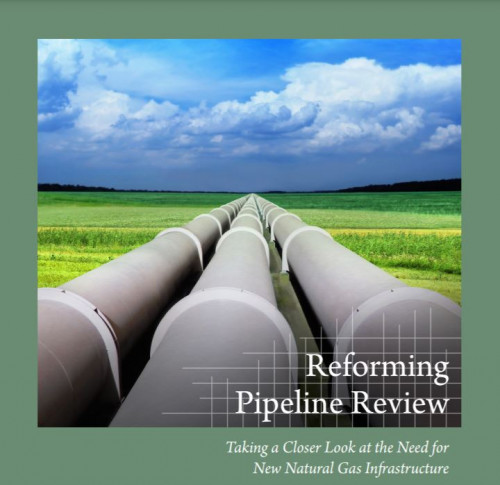-
Supplemental Comments Addressing Impact of West Virginia v. EPA on FERC’s Proposed Policy Statements for Natural Gas Infrastructure
In February, the Federal Energy Regulatory Commission proposed two policy statements that called for the consideration of climate impacts in pipeline certificate proceedings. In April, we filed two comments letters on these proposed policy statements, including one letter filed jointly with over two dozen legal scholars rebutting arguments that the Commission lacks authority to consider climate effects in its oversight of natural gas infrastructure under the Natural Gas Act and, relatedly, that the proposed policy statements implicate the major questions doctrine. Today, we submitted supplemental comments rebutting arguments that the Supreme Court’s recent decision on the major questions doctrine in West Virginia v. EPA somehow affects the Commission’s ability to finalize its proposed policy statements.
-
Comments to FERC on Transmission NOPR
We submitted comments to FERC providing recommendations for how it can clarify and improve reforms proposed in its Notice of Proposed Rulemaking addressing transmission planning and cost allocation. If finalized, the rulemaking would require planning entities to undertake long-term transmission planning. Our comments recommend that FERC clarify (at a high level) what it means to undertake long-term planning over a 20-year time horizon. We also recommend more specific improvements that can be made, including providing minimum uniform requirements on model specifications and scenario planning based on best practices; instituting administrative guardrails to protect transmission customers from excessive costs if the Commission moves forward with its proposed Right of First Refusal; and mandating a uniform set of core benefits that all planners must consider.
We also submitted reply comments in the proceeding to underscore two points. In response to commenters that argued the Commission should reconsider its proposal in light of the level of uncertainty surrounding the future, we argue that it is future uncertainty that necessitates the long-term scenario planning contemplated by the rule. Such proactive transmission planning will allow planners to prepare for and react to changing circumstances and ensure a reliable and resilient grid in the face of uncertainty. Additionally, our reply comments reaffirm previous recommendations that the Commission should require planners to use a standardized cost-benefit analysis that properly accounts for societal benefits of new transmission.
-
Comments to FERC on Regional Energy Access Expansion Project DEIS
Today we submitted comments to FERC on the draft environmental impact statement for Transcontinental Gas Pipe Line Co.'s Regional Energy Access Expansion Project. These comments offer recommendations for improving the Commission's assessment of climate and environmental justice impacts of the project, and its consideration of alternatives.
-
Comments to FERC on Iroquois Gas Certificate Order
Today we submitted comments to FERC regarding its decision to grant a certificate of public convenience and necessity to Iroquois Gas for its Enhancement by Compression Project. These comments begin by underscoring the Commission's obligation to independently review and scrutinize lifecycle greenhouse gas emission reports (or other evidence regarding net emissions associated with a project) submitted by applicants. The comments also highlight flaws in Iroquois' analysis which undermine the conclusion that the project will result in a decrease of emissions. The Commission overlooked these flaws in relying on the analysis to conclude the project would result in a net reduction, such that it need not further assess the project's climate impacts.
-
Reforming Pipeline Review
Taking a Closer Look at the Need for New Natural Gas Infrastructure
The Federal Energy Regulatory Commission (FERC) uses a flawed process to evaluate the need for new, long-lasting gas infrastructure such as interstate pipelines, resulting in a certification process that fails to serve the public interest. As FERC begins to re-examine its approval process for new natural gas infrastructure, our report analyzes the Commission’s authority to consider a broader range of factors when deciding whether a proposed project is in the public interest. The report offers four key recommendations for reform.
-
Comments to FERC on Climate Risks, Reliability, and Resilience
The Federal Energy Regulatory Commission requested responses to a number of questions on the effects of climate change and electric system reliability. In April 2021, we submitted comments highlighting opportunities to improve reliability and resilience by adjusting approaches the Commission and others take to planning, investing in, and operating grid components.
Then FERC, following a technical conference over the summer, requested further comments on a specific series of questions. In September 2021, we submitted joint comments describing process options and resources for conducting climate resilience planning, and emphasized how accounting for climate impacts is relevant to consumer costs.
-
Comments to FERC on PJM MOPR Reform
We submitted comments to the Federal Energy Regulatory Commission (FERC) encouraging the agency to accept PJM’s proposed changes to the Minimum Offer Price Rule, which recognizes that generation-based externality payment for clean electricity resources can be welfare-enhancing, and removes the artificial barrier to market entry for resources that receive payments under state climate policies created by the previous rule.
-
Comments to FERC Following Technical Conference on Market Design
The Federal Energy Regulatory Commission (FERC) requested input on the expanded minimum offer price rule (Expanded MOPR) in the PJM capacity market, as well as prospective alternative approaches that could replace PJM's Expanded MOPR. We submitted comments addressing the questions posed while drawing attention to reforms that FERC should undertake.
-
Comments on FERC’s Office of Public Participation
The Federal Regulatory Energy Commission (FERC) solicited comment from interested parties on how the Commission should structure their Office of Public Participation to facilitate public engagement. We submitted comments highlighting the potential benefits of public participation by environmental justice communities and identifying best practices that FERC’s Office of Public Participation (OPP) should adopt.
-
Comments and Reply Comments on FERC’s Carbon Pricing Policy Statement
The Federal Energy Regulatory Commission proposed a policy statement on carbon pricing in organized wholesale electricity markets. We submitted comments encouraging FERC to strengthen its proposal by making specific clarifications. We later submitted reply comments addressing points made by other commenters and providing further guidance on how FERC can improve its final policy statement.
Viewing recent projects in FERC








